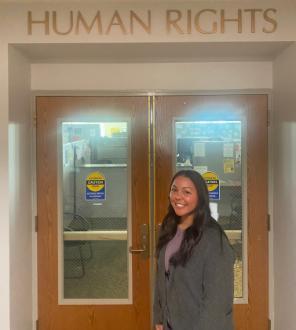Meet Cheyenne Voshell.
 Meet Cheyenne Voshell, a third-year student in the Occupational Therapy Doctorate program. Cheyenne will graduate in May of 2023 and completed her Doctoral Capstone with the Iowa Department of Human Rights - Criminal Juvenile Justice Planning Committee (JCCP).
Meet Cheyenne Voshell, a third-year student in the Occupational Therapy Doctorate program. Cheyenne will graduate in May of 2023 and completed her Doctoral Capstone with the Iowa Department of Human Rights - Criminal Juvenile Justice Planning Committee (JCCP).
Name: Cheyenne Voshell
Hometown: Waterloo, IA
Degree Program: OTD, May 2023
Doctoral Capstone placement: Iowa Department of Human Rights - Criminal Juvenile Justice Planning Committee (JCCP)
Tell us about your Doctoral Capstone. What were your responsibilities and what did a typical day look like for you?
What was your favorite thing about the capstone?
Aside from making connections with youth in these facilities, the opportunity to network and advocate on higher systemic levels. Not only advocating for youth and services in general, but occupational therapy's role within justice systems, specifically Iowa's juvenile and adult justice systems.
What attracted you to Drake's OTD program?
Drake's emphasis on experiential learning and opportunities to partner with community organizations to apply the skills you are learning in the classroom. In addition to Dr. Urish and her passion for mental health and integrating mental health topics throughout Drake's program. This was important for me because my primary interest area is mental health OT!
How has Drake helped you prepare for your future career as an occupational therapy professional?
Drake's OTD curriculum provides us with a very well-rounded education and scope of practice. We come out true generalists and I feel confident that I could choose to work in any setting after graduation and feel competent enough to at least try it!
What are your career goals? Have they changed at all since you started Drake's OTD program?
What is one piece of advice you would give to future occupational therapy students?
Go into your program and the occupational therapy profession open and ready to LEARN. OT is one of those careers where you have to be willing and ready to be constantly learning and adapting in order to continue building your own skills to provide quality care to the populations we serve. You have to love to learn and be willing to change your habits and routines to continue evolving and progressing OT as a profession. At the end of the day though, if you are ever uncertain about what you know or are unsure about what you should be doing with a client, remember to really take the time to listen to them and use your empathy always.
Return to the OTD Capstone Spotlight home page here.


